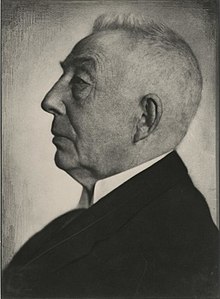Hendrikus Colijn
| Hendrikus Colijn | |
|---|---|

Colijn
|
|
| 25th Prime Minister of the Netherlands | |
|
In office 26 May 1933 – 10 August 1939 |
|
| Monarch | Wilhelmina |
| Preceded by | Charles Ruijs de Beerenbrouck |
| Succeeded by | Dirk Jan de Geer |
|
In office 4 August 1925 – 8 March 1926 |
|
| Monarch | Wilhelmina |
| Preceded by | Charles Ruijs de Beerenbrouck |
| Succeeded by | Dirk Jan de Geer |
| Personal details | |
| Born |
22 June 1869 Burgerveen, Netherlands |
| Died | 18 September 1944 (aged 75) Ilmenau, Germany |
| Political party | ARP |
| Spouse(s) | Helena Groenenberg (1867-1947) |
| Children | 3 |
| Occupation | Military Officer |
| Religion | Reformed |
| Signature |  |
Hendrikus "Hendrik" Colijn (22 June 1869 – 18 September 1944) was a Dutch soldier, businessman and politician who was Prime Minister of the Netherlands from 1925 to 1926 and again from 1933 to 1939.
He was born on 22 June 1869 in the Haarlemmermeer to Antonie Colijn and Anna Verkuijl, who had migrated to the newly created Haarlemmermeer polder from the Land of Heusden and Altena for religious reasons. He was the first of six children, all born in Haarlemmermeer. Colijn grew up in the Land of Altena.
At the age of 16, he went to a military academy in Kampen for officer training, where he graduated as a 2nd lieutenant in 1892. In 1893, he married Helena Groenenberg and was sent to the Dutch East Indies. During his 16 years in the Dutch East Indies, he spent ten years in the Colonial Army, serving in the Aceh War as the lieutenant of J. B. van Heutsz, and six further years in the Colonial administration, having the same role towards van Heutsz when the latter became Governor General in 1904.
Colijn's letters to his wife from his period on Lombok reveal his participation in acts of brutality which by modern standards would be considered severe war crimes:
After his return to the Netherlands in 1909, he was elected as an Anti Revolutionary Party Member of Parliament for the district Sneek (Before 1918, the Dutch voting system was the same as the British).
In 1911, he was appointed Minister of War and revised the Dutch Selective Service System. In May 1918 he acted as an intermediary between the British and Kaiser Wilhelm II of Germany to arrange an armistice, resulting in the Kaiser getting refuge in The Netherlands.
...
Wikipedia
